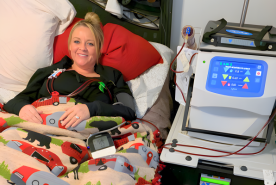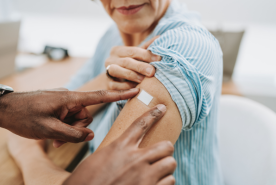Last updated: October 03, 2024
Medically reviewed by: NKF Patient Education Team
Vaccines help protect people with CKD from serious complications from diseases. Learn about safety, effectiveness, and addressing concerns with your healthcare provider.
NKF will continue to be a clear and trusted resource for information on the impact of vaccination policy for people living with kidney diseases. Years of evidence have shown vaccines to be safe and effective. They are crucial to the health and survival of patients with kidney disease, many of whom are immunosuppressed.
Vaccines
Vaccines play a critical role in protecting people from severe illness caused by preventable diseases. This includes individuals of all ages, especially those who are especially vulnerable, such as children, the elderly, or people with chronic health conditions like chronic kidney disease (CKD).
CKD weakens the immune system, making it harder for the body to fight infections. Vaccines help strengthen immune responses, reducing the risk of severe illness, hospitalization, or death from contagious diseases like influenza, measles, COVID-19, and whooping cough.
People who avoid vaccines, including parents hesitant to vaccinate their children, can miss out on needed protections. Children, in particular, are at risk of contracting diseases that can cause long-term health complications, and vaccination can help prevent this.
People with CKD, those on dialysis (a treatment that helps clean the blood when kidneys are not working well), or individuals who have had a kidney transplant are at a higher risk for serious complications from diseases – staying up to date with vaccinations can help lower this risk.
According to the World Health Organization, vaccine hesitancy occurs when people delay or refuse vaccines even though they are available, often because of worries about safety, whether the vaccine is needed, or how easy it is to get.
Vaccine Safety
All vaccines have been tested very carefully to make sure they are safe. Before a vaccine is allowed to be used, it goes through many testing steps. This process checks that the vaccine is safe and works well in different groups of people, including those with health conditions like CKD.
The testing process includes clinical trials that monitor how the vaccine interacts with different groups of people to make sure it is safe and effective. Vaccines, like the MMR (measles, mumps, and rubella) and DTaP (diphtheria, tetanus, and pertussis) vaccines, have a long track record of safety across different populations.
Even after vaccines are approved, health experts continue to watch closely to make sure they remain safe and effective. Organizations like the Centers for Disease Control and Prevention (CDC) and the World Health Organization (WHO) keep checking the safety of vaccines. They update their advice if new information comes out. For people on dialysis or those who have had a kidney transplant, it is important to talk to a doctor to decide the best time to get vaccinated and to discuss any specific worries.
Vaccine Effectiveness
Vaccines are highly effective at preventing diseases. For example, childhood vaccines have nearly eliminated diseases like polio and smallpox, which in the past caused widespread illness and death. Vaccination is particularly important for individuals with weakened immune systems, such as those living with CKD, as it can still offer significant protection against severe disease. Vaccines are most effective when administered according to the recommended schedules, which vary depending on age and health conditions.
It’s also important to note that vaccines not only protect the individual receiving them but also the broader community. This concept, known as herd immunity, helps protect people who cannot be vaccinated for medical reasons. For parents, vaccinating children helps protect their kids and others in the community, such as newborns or immunocompromised individuals, from preventable diseases.
Barriers to Vaccination
Even though the benefits of vaccination are clear, there are still reasons why some people might not get vaccinated. The reasons for vaccine hesitancy are varied and can include:
- Misinformation and Concerns about Vaccine Safety: Some people may hear incorrect information about vaccine safety or worry about side effects. For example, they might think the vaccine could hurt their kidneys or cause problems with their current treatments. However, studies show that many vaccines are safe and do not damage the kidneys. Getting information from trusted sources and talking to your healthcare provider is a great way to get the facts.
- Access to Vaccination: Getting vaccinated might be hard for some people due to problems like finding time for an appointment, transportation issues, or coordinating with dialysis schedules. Many vaccination sites offer special help for people with health needs, and some clinics may provide vaccines during regular visits, such as during dialysis sessions. Patients should talk to their healthcare team to find the easiest vaccination method.
- Concerns about Vaccine Effectiveness: Some people think the vaccine won’t work well for them because they may have a weakened immune system. While it’s true that people with CKD may have a weaker immune response, vaccines can still provide important protection against severe illness, hospitalization, and death. Staying up to date with vaccinations can help improve the body’s response to the vaccine.
- Fear of Side Effects: Worries about side effects like feeling tired, having a sore arm, or getting a fever are common. These side effects are usually mild and go away on their own. People on dialysis or those who have had a kidney transplant should discuss the best timing for vaccination with their healthcare provider to help manage any side effects.
- Religious Beliefs: For some, religious beliefs may influence decisions about vaccines, especially when there are concerns about ingredients derived from animals or how vaccines are made. However, many religious leaders support vaccination for its role in protecting individual and community health. If you have concerns, it can be helpful to consult both your healthcare provider and a trusted religious leader to ensure your choices align with your beliefs while safeguarding your health.
Questions to Ask Your Healthcare Team
When considering vaccination, talking with your healthcare team can be helpful. Here are some questions you might want to ask, along with why these questions are important:
- How might the vaccine affect my kidney function or treatment plan?
Knowing how the vaccine could impact your kidney function or ongoing treatments helps you make an informed decision. - Are specific vaccines more suitable for people with CKD?
Different vaccines may cause different kinds of reactions in people. This question helps identify which vaccines may be the best option for you. - What are the potential side effects, and how can I manage them if they occur?
Understanding the possible side effects and how to manage them will prepare you for what to expect after vaccination. - How will the vaccine interact with my current medications, especially immunosuppressive drugs?
Understanding any interactions with the vaccine for people taking medications that weaken the immune system is important. - Can I receive the vaccine during a dialysis session, or should it be scheduled separately?
This question helps plan the best time to get vaccinated, minimizing disruption to your dialysis schedule. - Are there any special considerations for kidney transplant recipients?
Transplant recipients have unique needs and risks; knowing these can help you to make a safe choice.








